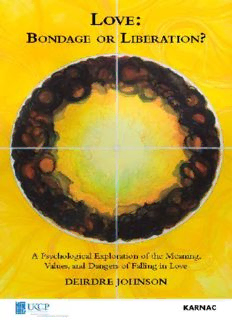
Love: Bondage Or Liberation?: A Psychological Exploration of the Meaning, Values and Dangers of Falling in Love PDF
Preview Love: Bondage Or Liberation?: A Psychological Exploration of the Meaning, Values and Dangers of Falling in Love
CHAPTERTITLE I LOVE: BONDAGE OR LIBERATION? Other titles in the UKCP Series: What is Psychotherapeutic Research? Del Loewenthal Diversity, Discipline and Devotion in Psychoanalytic Psychotherapy: Clinical and Training Perspectives Gertrud Mander Shakespeare on the Couch Michael Jacobs Dialogue and Desire: Mikhail Bakhtin and the Linguistic Turn in Psychotherapy Rachel Pollard Our Desire of Unrest: Thinking About Therapy Michael Jacobs Not Just Talking: Conversational Analysis, Harvey Sacks' Gift to Therapy Jean Pain The Muse as Therapist: A New Paradigm for Psychotherapy Heward Wilkinson The Emergent Self: An Existential–Gestalt Approach Peter Philippson Psychosis in the Family: The Journey of a Psychotherapist and Mother Janet C. Love Hidden Twins: What Adult Opposite Sex Twins Have To Teach Us Olivia Lousada Child-Centred Attachment Therapy: the CcAT Programme Alexandra Maeja Raicar The 3-Point Therapist Hilary A. Davies The Use of Psychoanalytic Concepts in Therapy with Families: For All Professionals Working with Families Hilary Davies LOVE: BONDAGE OR LIBERATION? A Psychological Exploration of the Meaning, Values, and Dangers of Falling in Love Deirdre Johnson On behalf of the United Kingdom Council for Psychotherapy First published in 2010 by Karnac Books Ltd 118 Finchley Road, London NW3 5HT Copyright © 2010 to Deirdre Johnson The right of Deirdre Johnson to be identified as the author of this work has been asserted in accordance with §§ 77 and 78 of the Copyright Design and Patents Act 1988. All rights reserved. No part of this publication may be reproduced, stored in a retrieval system, or transmitted, in any form or by any means, electronic, mechanical, photocopying, recording, or otherwise, without the prior written permission of the publisher. British Library Cataloguing in Publication Data A C.I.P. for this book is available from the British Library ISBN-13: 978 1 85575 510 9 Edited, designed and produced by The Studio Publishing Services Ltd www.publishingservicesuk.co.uk e-mail: [email protected] Printed in Great Britain www.karnacbooks.com CONTENTS ACKNOWLEDGEMENTS vii ABOUT THE AUTHOR ix PREFACE xi INTRODUCTION xiii PART I: AQUEST FOR MEANING: 1 THE DIFFERENT NARRATIVES TO DESCRIBE THE PHENOMENON OF FALLING IN LOVE (A) What we have been: the first love affair CHAPTER ONE The psychoanalytic discourse: emphasizing the 3 intrapersonal CHAPTER TWO The relational psychologies discourse: including 25 the interpersonal v vi CONTENTS PART I (B) What we are: embodied beings 55 CHAPTER THREE The scientific discourse 57 PART I (C) What we may be: individuation 79 CHAPTER FOUR The teleological discourse 81 CHAPTER FIVE The religious discourse 121 PART II: LOVE’S ALCHEMY: 147 PUTTINGITALLTOGETHER CHAPTER SIX Various dualisms and their synthesis 149 CHAPTER SEVEN Holistic love: what difference does all of this make? 165 REFERENCES 181 INDEX 189 ACKNOWLEDGEMENTS The ideas for this book came out of a series of seminars and workshops that I gave to qualified counsellors and psychothera- pists for continuing professional development. I would like to thank Jennifer Ransom and Hilary Parry for initiating the first of these and for their enthusiasm and encouragement. I am also grateful to Laura Henman and Moira Houston, who first suggested that I might write about these ideas, and to the UKCP–Karnac editorial team, whose initiative allowed this suggestion to become a practical reality. My sister, Debbie Johnson, herself a professional in the field, has given invaluable support in reading the entire manuscript and offering many helpful suggestions. Gerry Hughes, SJ, has been of great assistance in helping with the planning of the work as a whole and in helping me hone my thoughts in relation to some of the ideas. I am grateful to Muriel Maufroy, who first intro- duced to me the little Sufi story within these pages. Above all, I would like to thank my husband, Laurence Hillel, who has so gen- erously encouraged me in my endeavours and whose continued patient support and painstaking help with the references has been invaluable. vii viii ACKNOWLEDGEMENTS Permissions I would like to thank the following publishers for permission to reprint the material as cited below: Pan Macmillan, London for the poem “Text”, from Rapture. Copyright © to Carol Ann Duffy, 2005 The extract from “Looking for your face”, from The Love Poems of Rumi, edited by Deepak Chopra, published by Rider. Reprinted by permission of The Random House Group Ltd. Coleman Barks at Maypop Books, for the extract from Chapter 27, The Essential Rumi. Translated by Coleman Barks with John Moyne. Copyright © to Coleman Barks, 1995. HarperCollins Publishers Ltd. for the quatrain from Rumi, Whispers of the Beloved, selected and translated by Maryam Mafi and Azima Melita Kolin. Copyright © to Maryam Mafi and Azima Melita Kolin, 1999. Shambala Publications Inc. for the extracts from Open Secret: Versions of Rumi, by John Moyne and Coleman Barks. Copyright © to John Moyne and Coleman Barks, 1984. ABOUT THE AUTHOR Deirdre Johnson is a Training Analyst with the Association of Jungian Analysts and a member of the International Association for Analytical Psychology. She has taught counsellors and psycho- therapists for a variety of UKCP and BACP training organizations and has led workshops for Continuing Professional Development in many different environments. She has had her own practice for over 25 years. Further work has been within the NHS and in specialist experience with ethnic minorities. She lives in London with her family. ix
Description: